Activities
Guitar Lessons : Activities for Seniors Citizens
Wondering how guitar lessons can enhance seniors' cognitive abilities and well-being? Explore the unexpected benefits awaiting older adults in this engaging activity.

Have you ever thought about how guitar lessons can improve cognitive functions and overall health in elderly individuals?
Exploring the world of music through guitar lessons can offer seniors a multitude of advantages, from enhancing memory and focus to fostering creativity and providing a sense of accomplishment.
As we uncover the various aspects of guitar lessons for seniors in the following discussion, we will discover how this engaging activity can truly enrich the lives of older adults in unexpected ways.
Key Takeaways
- Guitar lessons benefit seniors' cognitive function and memory retention.
- Choose a comfortable acoustic guitar for seniors with smaller frames.
- Limit lesson watch time for better focus and retention.
- Incorporate music therapy to enhance well-being and quality of life.
Benefits of Guitar Lessons for Seniors
Embarking on guitar lessons as a senior can open a world of benefits that enhance cognitive function, memory retention, and hand-eye coordination. Learning to play the guitar not only introduces a new skill but also stimulates the brain, keeping it active and engaged. The process of learning chords, melodies, and rhythms can improve memory function, which is especially beneficial for older adults looking to maintain mental sharpness.
Moreover, mastering the guitar enhances hand-eye coordination as you synchronize your movements to create music. This improvement in motor skills can have a positive impact on daily activities and overall physical well-being. Playing the guitar also offers a creative outlet for self-expression, allowing seniors to explore their artistic side and boost their mental well-being.
In addition to these cognitive and physical benefits, guitar lessons provide a sense of accomplishment and fulfillment. The joy of learning something new and the satisfaction of mastering a song can greatly enhance one's quality of life. Ultimately, engaging in guitar lessons as a senior offers a fun and rewarding experience that promotes active aging and social connectivity.
Choosing the Right Guitar for Seniors

When selecting a guitar for seniors, it's important to prioritize comfort and ease of handling to ensure an enjoyable learning experience. As an older adult looking to learn to play, consider opting for an acoustic guitar that's comfortable to hold and play.
For seniors with a smaller frame, a smaller-sized guitar might be a better fit, allowing for easier handling and maneuvering. Lightweight guitars are ideal for those with reduced strength, reducing strain on the arms and shoulders during practice sessions.
Look for a guitar with low-action strings, as they require less force to press down, making it easier on the hands and fingers. Consulting with a guitar expert can be incredibly helpful in finding the perfect instrument that suits your individual needs and preferences.
Tips for Learning Guitar as a Senior
To make the most of your guitar learning journey as a senior, let's explore practical tips that can enhance your progress and enjoyment. As senior citizens, it's beneficial to limit lesson watch time to maintain focus and retention. Using a device you're familiar with can help you easily follow along with guitar lessons. Try watching lessons with a guitar in hand to practice and apply new skills immediately.
To enhance muscle memory and independence in playing, practice away from a screen. Opting for an acoustic guitar during lessons can effectively build strength and technique. Remember, consistent and focused practice is key to improvement. Embrace the journey of learning guitar at your own pace, and don't hesitate to seek additional guidance or clarification when needed.
Enjoy the process of discovering new melodies and skills as you embark on this musical adventure.
Incorporating Music Therapy for Seniors
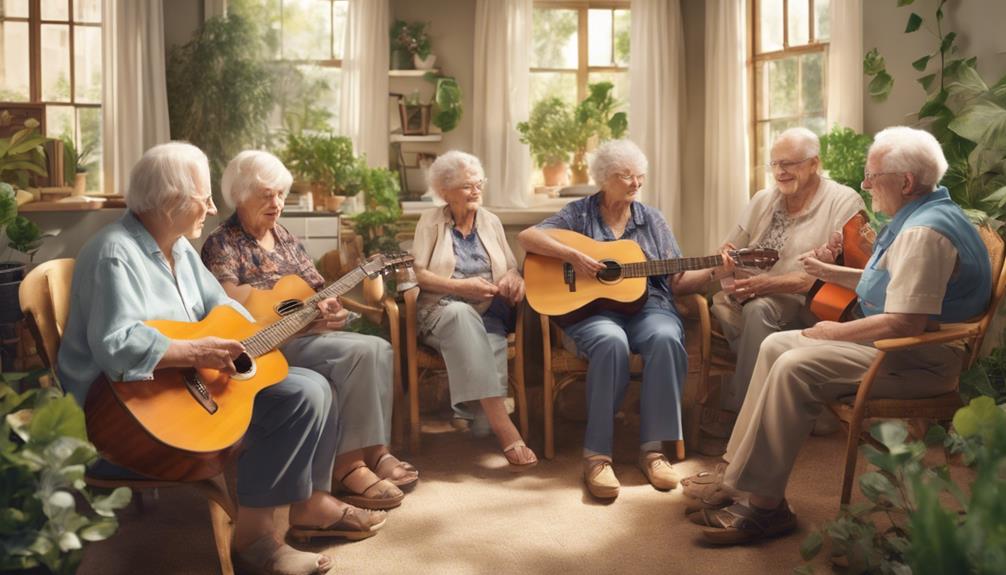
Utilizing music therapy can significantly enhance the well-being and quality of life for senior citizens. Music therapy has been proven to improve cognitive function, memory retention, and emotional well-being in seniors. By incorporating music into senior activities, we can help reduce stress, anxiety, and depression, creating a more positive environment for our elderly community members.
Furthermore, participation in music therapy programs fosters social interaction and enhances communication skills among seniors, promoting a sense of connection and belonging. The stimulation of brain activity through music not only boosts cognitive functions but also promotes relaxation, leading to an overall increase in the quality of life for seniors.
In senior care facilities, implementing music therapy can create a vibrant sense of community and engagement, enriching the lives of residents. Let's continue to explore the power of music in enhancing the well-being of our seniors and creating joyful experiences for them.
Overcoming Challenges in Senior Guitar Learning
As we explore the challenges faced by senior guitar learners, it's essential to address common physical discomforts that may arise during practice sessions, such as finger, wrist, and elbow pain. Seniors can overcome finger pain by gradually building strength and dexterity through consistent practice, allowing for improved endurance. Adjusting wrist posture while playing chords can help alleviate wrist pain, ensuring a more comfortable playing experience for seniors. Additionally, using a wrist brace during guitar practice can provide the necessary support and reduce discomfort for seniors experiencing wrist pain, promoting better wrist alignment.
To prevent elbow pain, such as tendinitis or tennis elbow, in senior guitar learners, incorporating proper warm-up exercises before playing is crucial. These exercises can help prepare the muscles and joints for the movements involved in playing the guitar. If seniors experience elbow pain, it's essential to rest the arm and allow time for recovery to avoid further strain. By addressing these challenges with care and patience, seniors can enhance their guitar practice and enjoy the benefits of music in a comfortable and sustainable manner.
Frequently Asked Questions
What Is the Best Way for an Older Person to Learn Guitar?
The best way to learn guitar is by starting with the basics, like chords and strumming patterns, and then practicing regularly. Utilizing phone apps and YouTube tutorials can also be helpful for self-learning.
Finding a local teacher who specializes in teaching older adults can provide valuable support. Remember, patience and dedication are key to progressing in your guitar journey.
Keep practicing and enjoy the process of learning something new!
Can a 70 Year Old Learn Guitar?
Absolutely! Learning guitar at 70 isn't only possible but also incredibly rewarding. With dedication and practice, anyone can pick up this skill at any age.
It's a fulfilling experience that brings joy and a sense of accomplishment. Don't let age hold you back from pursuing new passions.
How Can I Make My Guitar Lesson More Fun?
To make guitar lessons more fun, we suggest incorporating engaging songs and interactive activities.
Try adding chord progression games, rhythm exercises, and themed lessons around genres seniors enjoy.
Encourage social interaction through group lessons and include creative elements like songwriting and improvisation to keep things dynamic and enjoyable.
How Can I Make Learning Guitar Enjoyable?
Learning guitar can be enjoyable by choosing songs we love, practicing with friends, setting achievable goals, experimenting with different styles, and rewarding ourselves for progress.
It's important to keep the journey fun and engaging. By incorporating social elements, tracking progress, and staying motivated, we can make the learning process exciting and fulfilling.
Let's embrace the challenges and celebrate the milestones together on this musical journey!
Conclusion
As we strum our way through guitar lessons, we uncover the beauty of music and the power of creativity.
Just like the strings of a guitar produce harmonious melodies, seniors can find harmony in their hearts and minds.
Embrace the rhythm of learning, let your fingers dance on the fretboard, and unlock the symphony of joy that music brings.
Keep playing, keep learning, and let the music guide you on this beautiful journey of self-discovery.
Albert brings a wealth of knowledge and expertise to our writing team. With a background in caregiving and a deep understanding of the challenges faced by caregivers, Albert’s writing resonates with authenticity and empathy. He is committed to delivering high-quality content that empowers and supports caregivers on their journey.
Activities
Making Memories, Not Enemies, With Your Loved One With Dementia
Dive into the delicate art of connecting with your loved one with dementia, and discover how each moment can shape your relationship.

Supporting a loved one with dementia requires careful navigation as each interaction holds significant weight. Our approach and ability to connect with them directly impacts their daily experiences and our relationship with them.
By understanding their unique needs and behaviors, we lay the foundation for meaningful experiences that transcend memory loss. But how do we navigate this challenging terrain with grace and compassion, ensuring that each moment is filled with love and understanding?
Let's explore the art of creating lasting memories and fostering strong emotional bonds with our loved ones on this dementia journey.
Key Takeaways
- Emotional connections enhance care quality.
- Engage in activities tapping into old memories.
- Use simple, clear communication for comprehension.
- Create a supportive, familiar environment for comfort.
Understanding Dementia Behavior Patterns
Understanding the intricate behavior patterns associated with dementia can be both challenging and enlightening for caregivers and loved ones alike. Memory loss is a hallmark of dementia, which progresses through different stages, impacting behavior in various ways. In the early stages, memory loss may be subtle, with occasional forgetfulness and difficulty recalling recent events. As dementia advances, memory loss becomes more pronounced, affecting not only short-term but also long-term memories. This progression can lead to disorientation, where individuals may struggle to recognize familiar faces or places.
Navigating the stages of dementia requires patience and understanding. As memory loss worsens, individuals may exhibit agitation, aggression, or engage in aimless wandering. Communication difficulties can arise from disjointed sentences and cognitive impairments, making it challenging to connect with loved ones. Despite these challenges, caregivers may experience occasional moments of connection with dementia patients, fostering understanding and compassion. It's essential to approach each interaction with empathy and adapt communication strategies to suit the individual's needs. Through patience and support, caregivers can help individuals with dementia navigate their changing behavior patterns with dignity and respect.
Building Emotional Connections

Navigating the challenges of dementia behavior patterns illuminates the significance of building emotional connections with our loved ones facing this condition. In the realm of dementia, where verbal communication may falter, emotional connections act as bridges that link us to our loved ones. It's through empathy, patience, and a willingness to understand that we can forge these vital connections.
By showing unwavering support and love, we not only strengthen our relationships but also enhance the quality of life for both the individual with dementia and ourselves as caregivers. These emotional bonds form the foundation for creating lasting and positive memories with our loved ones.
Prioritizing emotional connections over verbal exchanges enables us to engage in meaningful interactions that transcend language barriers and cognitive limitations. In the realm of dementia care, building emotional connections isn't just a choice but a necessity that fosters a sense of belonging, security, and love for our loved ones with dementia.
Engaging in Meaningful Activities
Engaging in activities that hold personal significance can greatly enhance the well-being and connection with our loved ones who've dementia. Alzheimer's disease can make it challenging for individuals to retain recent memories, but old memories often remain intact. By engaging in activities that tap into these old memories, we can create meaningful experiences for our loved ones.
Simple activities like looking through old photo albums or baking family recipes can evoke joyful memories and spark moments of connection. These memory-evoking activities have the power to trigger positive emotions and create a sense of familiarity and comfort for individuals with dementia.
When we engage in activities that have personal meaning to our loved ones, we not only provide them with moments of joy but also strengthen our emotional bond with them. These activities can serve as a bridge to the past, allowing us to share in cherished memories and experiences together. Through these meaningful interactions, we can create lasting memories that bring happiness and connection to both our loved ones and ourselves.
Effective Communication Techniques

In our interactions with loved ones who have dementia, employing effective communication techniques is crucial for fostering understanding and connection. When communicating with a person with dementia, it's important to use simple and clear language to enhance comprehension. Maintaining eye contact and speaking slowly can help the individual process information more effectively. Non-verbal communication through gestures, touch, and facial expressions also plays a significant role in conveying emotions and connecting on a deeper level. Active listening, which involves giving your full attention and validating the person's feelings and experiences, is key to building trust and rapport. Being patient, compassionate, and empathetic in your interactions can create a supportive environment that nurtures a sense of connection.
| Effective Communication Techniques |
|---|
| Use simple and clear language |
| Maintain eye contact and speak slowly |
| Encourage non-verbal communication |
| Practice active listening |
| Be patient, compassionate, and empathetic |
Creating a Supportive Environment
To provide comfort and stability for a loved one with dementia, creating a supportive environment involves minimizing distractions and establishing a calming atmosphere. It's crucial for family members to understand that individuals with any form of dementia thrive in familiar settings.
Utilizing familiar objects and routines can create a sense of security and comfort for them. Establishing a predictable daily schedule is also beneficial as it reduces confusion and anxiety. Safety is paramount, so removing hazards and incorporating memory aids like labels or color-coded items in their living space can prevent accidents.
Encouraging independence is empowering; setting up easy-to-use systems and supporting activities that promote a sense of accomplishment can boost their self-esteem. By prioritizing these elements in the environment, family members can help their loved ones with dementia feel more at ease and enhance their overall quality of life.
Frequently Asked Questions
When Should You Move Someone With Dementia to Assisted Living?
When should we move someone with dementia to assisted living?
It's crucial to assess their safety and daily functioning first. Signs like missing medications or struggling with personal care may indicate the need. We must also consider the caregiver's well-being, as constant care can be overwhelming.
Involving the person with dementia in the decision-making process is important, along with seeking advice from healthcare professionals and support groups to make an informed choice.
How to Tell a Loved One With Dementia They Are Going to a Nursing Home?
We gently explained the move to a nursing home, stressing the specialized care and safety available. Involving them in the decision-making process helped maintain a sense of control and understanding.
Reassurance and support were crucial, acknowledging their feelings and concerns throughout. Seeking guidance from healthcare professionals ensured a smooth transition. Our empathy and clear communication made the conversation more manageable for everyone involved.
How Do You Help a Loved One With Memory Loss?
Helping a loved one with memory loss involves creating a supportive environment. Encourage memory-evoking activities, use triggers like music or family heirlooms, and focus on person-centered care.
Involve family members in memory activities, such as looking at photos together or sharing personal thoughts. Home care services like Home Instead CAREGivers can provide specialized support for Alzheimer's care.
Conclusion
In conclusion, it's important to remember that individuals with dementia are still capable of forming meaningful connections and creating new memories.
One fascinating statistic to note is that engaging in memory-evoking activities can lead to a 50% increase in positive interactions with loved ones with dementia.
By approaching interactions with love, understanding, and patience, we can make lasting memories and strengthen our relationships despite the challenges of memory loss.
Let's continue to make memories, not enemies, with our loved ones with dementia.
Albert brings a wealth of knowledge and expertise to our writing team. With a background in caregiving and a deep understanding of the challenges faced by caregivers, Albert’s writing resonates with authenticity and empathy. He is committed to delivering high-quality content that empowers and supports caregivers on their journey.
Activities
How Robotic Dog for Seniors Improve Quality of Life
Discover the surprising ways in which robotic dogs for seniors bring joy, companionship, and support, enhancing their quality of life in extraordinary ways.

When considering the impact of technology on the elderly, one cannot ignore the significant role that robotic dogs play. These advanced companions have revolutionized elderly care by providing a unique blend of support and interaction, ultimately improving their overall quality of life.
But what exactly sets these robotic canine companions apart and how do they manage to improve the quality of life for seniors in such a remarkable way? Let's explore the fascinating realm of robotic dogs for seniors and uncover the multitude of benefits they bring to the lives of older adults.
Key Takeaways
- Enhances emotional well-being and companionship for seniors.
- Stimulates physical and mental health through interactive engagement.
- Reduces loneliness and isolation, promoting social interactions.
- Improves overall quality of life by providing constant companionship and purpose.
Benefits of Robotic Dogs for Seniors
Robotic dogs for seniors offer a revolutionary solution to improve emotional well-being, physical activity, and companionship in older adults. These companion pets hold immense potential in enhancing the lives of seniors, particularly those facing conditions like dementia or Alzheimer's.
The presence of a robotic dog can provide a sense of purpose to seniors, reducing stress and loneliness while promoting social interactions. As cognitive decline is a common concern in aging individuals, the interactive nature of these robotic dogs can help stimulate the mind and keep seniors engaged.
Studies have shown that the companionship offered by these robotic pets can significantly improve the mood and overall quality of life for seniors. By incorporating robotic dogs into the lives of older adults, we can create a more supportive and enriching environment that caters to their emotional and physical needs.
Promoting Companionship and Social Interaction

How can these interactive companion pets enhance social connections and combat feelings of loneliness in seniors?
Robotic dogs for seniors play a vital role in promoting companionship, encouraging social interaction, and providing emotional support. Here are some ways these robotic pets help combat loneliness and enhance quality of life:
- Constant Companionship: Robotic dogs offer seniors a constant source of companionship, reducing feelings of isolation.
- Responsive Behaviors: By engaging with users through responsive behaviors, these companions stimulate social interaction and emotional connections.
- Combatting Loneliness: Robotic dogs help seniors combat feelings of loneliness and isolation by providing consistent company and interaction.
- Encouraging Activities: These companions encourage seniors to engage in various activities, fostering social connections and reducing solitude.
- Opportunities for Bonding: By mimicking real pets, robotic dogs create opportunities for seniors to bond and form meaningful relationships, enhancing their overall quality of life.
Enhancing Physical and Mental Well-being
To further improve the well-being of seniors, it's crucial to explore how interactive companion pets contribute to both physical and mental health. Robotic dogs play a vital role in enhancing physical and mental well-being among older adults. These companions offer more than just comfort; they engage seniors in physical activities, promoting movement and exercise that improves overall physical health.
Additionally, the cognitive stimulation provided by interacting with robotic dogs helps maintain and enhance cognitive abilities in seniors. The emotional support offered by these robotic pets is invaluable, reducing stress, anxiety, and feelings of loneliness, thus significantly boosting mental well-being.
Furthermore, the companionship and comfort provided by robotic dogs create a sense of routine and purpose, leading to a more structured and fulfilling daily life for seniors. Studies have shown that these interactions can elevate mood, increase social engagement, and foster emotional connections, all contributing to a higher quality of life for older adults.
Addressing Loneliness and Isolation

Loneliness and isolation among seniors pose significant challenges that necessitate compassionate solutions tailored to enhance emotional well-being and foster meaningful connections. Robotic dogs offer a unique way to address these issues by providing constant companionship and emotional support.
Here are some key ways robotic dogs help seniors combat loneliness and isolation:
- Constant Companionship: Robotic dogs offer seniors a constant presence, reducing feelings of solitude.
- Emotional Well-being: Studies demonstrate that interaction with robotic pets can enhance emotional well-being in older adults.
- Source of Comfort: Robotic dogs provide comfort and emotional support, especially for seniors living alone.
- Coping Mechanism: The presence of robotic dogs helps seniors cope with loss, grief, and physical limitations by offering companionship.
- Quality of Life Improvement: Robotic dogs contribute to improving the quality of life for seniors by providing consistent emotional connection and support.
These robotic companions play a crucial role in alleviating loneliness and isolation, ultimately enhancing the overall well-being of seniors.
Improving Quality of Life for Seniors
Robotic dogs have emerged as a groundbreaking solution for enhancing the quality of life for seniors, offering companionship, reducing stress, and promoting overall well-being. These interactive pets provide a sense of companionship and joy, especially for seniors living with Alzheimer's or other chronic conditions. Companion Pets not only help alleviate feelings of loneliness but also encourage physical activity and mental engagement, contributing to emotional well-being and cognitive stimulation.
Research indicates that robotic pets positively impact seniors by boosting their mood and overall quality of life. Unlike traditional pets, robotic dogs require minimal maintenance, eliminating the need for feeding, grooming, or veterinary care. By fostering emotional connections and providing constant companionship, these innovative companions play a vital role in improving the well-being and happiness of our beloved seniors.
Embracing robotic pets as part of the care for our loved ones can significantly enhance their daily lives and bring comfort to their hearts.
Frequently Asked Questions
What Are the Benefits of Robotic Dogs?
When we explore the benefits of robotic dogs, we uncover a world of companionship and comfort. These lifelike companions offer a unique blend of interactive engagement and stress relief.
Are Robotic Pets as Good as Real Ones for Older Adults?
Absolutely, robotic pets can be just as good as real ones for older adults in certain situations.
While they may not fully replicate the experience of having a live animal, robotic pets offer companionship and emotional support without the same level of care required.
They can reduce loneliness and provide comfort, making them a valuable option for seniors who may have limitations in caring for a real pet.
Are Robotic Pets as Good for Mental Health as the Real Thing?
Absolutely, robotic pets can be just as beneficial for mental health as real ones. While some may argue that they lack the authenticity of living animals, studies show that robotic pets provide companionship, emotional support, and stress relief to seniors.
Their low-maintenance care and ability to trigger positive emotions make them a valuable tool for improving mental well-being. The bond formed with robotic pets can truly enhance the quality of life for seniors.
Why Are Robotic Pets Good for Dementia Patients?
We find that robotic pets are beneficial for dementia patients due to their ability to provide companionship, stimulate cognitive functions, and offer a sense of routine. These factors contribute to reducing feelings of loneliness and isolation while promoting a calming environment.
Additionally, robotic pets require less care than real animals, making them ideal companions for those with limitations in pet care. Studies have shown that these pets can enhance the mood and overall well-being of dementia patients.
Conclusion
In conclusion, robotic dogs for seniors are more than just mechanical companions; they're symbols of love, comfort, and joy.
These innovative companions have the power to transform the lives of older adults by providing them with the support they need to thrive emotionally, physically, and mentally.
Through research-driven design and empathetic understanding of seniors' needs, robotic dogs offer a new way to enhance the quality of life for our beloved elders.
Albert brings a wealth of knowledge and expertise to our writing team. With a background in caregiving and a deep understanding of the challenges faced by caregivers, Albert’s writing resonates with authenticity and empathy. He is committed to delivering high-quality content that empowers and supports caregivers on their journey.
Activities
15 Activities for Dementia Patients at Home
Liven up your caregiving routine with tailored activities that bring joy and connection to dementia patients at home.

As we navigate the challenges of caring for loved ones with dementia, we often come across moments of joy and connection amidst the struggles. Discovering effective ways to engage dementia patients at home can be rewarding and therapeutic.
From simple sensory experiences to interactive games and creative projects, the possibilities are endless. By exploring a variety of activities tailored to individual preferences and abilities, we can unlock hidden potentials and foster a sense of purpose in those we care for.
Key Takeaways
- Nature walks and sensory activities boost well-being and engagement.
- Cognitive stimulation through yoga, puzzles, and dance aids memory and function.
- Emotional well-being enhanced by music therapy, art, and storytelling.
- Social interaction vital with outdoor walks, storytelling, and simple games.
Outdoor Nature Walks
Let's embark on rejuvenating outdoor nature walks, a soothing and enriching activity for dementia patients. These walks offer more than just physical exercise; they provide valuable sensory stimulation through the gentle rustling of leaves, the chirping of birds, and the sight of vibrant flowers. For individuals with dementia, these sensory experiences can evoke memories, spark joy, and improve overall well-being.
Research shows that walking in nature can significantly reduce stress, anxiety, and depression in dementia patients. The exposure to green spaces during these walks has the power to elevate mood, enhance cognitive function, and create a sense of tranquility. Additionally, outdoor nature walks present opportunities for social interaction, fostering connections with caregivers, nature, and fellow walkers.
Engaging in outdoor activities, such as nature walks, not only enhances the quality of life for dementia patients but also promotes a sense of calm and relaxation. These walks enable individuals to connect with the environment, appreciate the beauty of nature, and experience moments of peace and contentment.
Indoor Sensory Activities

Let's explore how we can stimulate the mind, engage the senses, and promote relaxation through indoor sensory activities for dementia patients.
By providing opportunities to feel different textures like silk, burlap, wool, and linen, we can offer a multi-sensory experience that enhances cognitive stimulation.
Engaging in activities such as sorting wooden beads by shape can bring about a sense of calm and focus, contributing to the overall well-being of individuals with dementia.
Stimulating the Mind
Engaging in sensory activities at home can provide valuable stimulation for dementia patients, enhancing their cognitive skills and overall well-being. Stimulating activities such as aromatherapy to awaken the sense of smell or creating sensory bins with various textures like rice and beans can offer a sense of accomplishment and engagement.
Meaningful activities like listening to calming music can reduce anxiety and promote relaxation, benefiting both the mind and spirit. For a visual and auditory experience, virtual reality nature walks can transport individuals to peaceful settings, fostering cognitive functions and a sense of well-being.
Engaging the Senses
Exploring different sensory activities indoors can offer valuable cognitive stimulation and relaxation for dementia patients, enhancing their overall well-being and quality of life.
Sensory activities like aromatherapy, music therapy, and tactile experiences can play a significant role in engaging the senses of individuals with dementia. Aromatherapy hand massages or diffusing calming scents can create a soothing atmosphere, while listening to familiar music can evoke positive emotions and memories.
Tactile experiences such as touching different textures or engaging in sensory bins filled with various materials can provide both stimulation and comfort. These indoor sensory activities not only help reduce anxiety but also promote a sense of calmness and improved well-being, making a meaningful impact on the lives of dementia patients.
Promoting Relaxation
How can we create a serene and comforting environment through indoor sensory activities to promote relaxation for dementia patients at home? Indoor sensory activities like aromatherapy, music therapy, and relaxation techniques can help in calming and reducing stress for individuals with dementia. Engaging in activities such as sensory bins, guided meditation, and progressive muscle relaxation can offer soothing experiences. To enhance relaxation, consider creating a spa-like ambiance with soft lighting, calming music, and aromatherapy scents. Incorporating sensory stimulation through mindful coloring, hand massages using scented lotions, and nature sounds can help promote relaxation. The table below highlights some indoor sensory activities that can create a peaceful and comforting atmosphere for dementia patients at home.
| Sensory Activities | Relaxation Techniques | Benefits |
|---|---|---|
| Aromatherapy | Guided Meditation | Calmness and stress reduction |
| Music Therapy | Progressive Muscle Relaxation | Soothing experiences |
| Mindful Coloring | Nature Sounds | Sensory stimulation |
Memory Scrapbooking

Memory scrapbooking offers a creative and personalized way for dementia patients to reminisce and connect with their past experiences. It involves compiling memory books with photos, mementos, and captions, providing visual cues that can stimulate reminiscence.
Engaging in memory scrapbooking not only helps individuals recall significant events and people from their past but also has cognitive benefits. This activity can enhance cognitive function, boost mood, and instill a sense of achievement in those with dementia.
Kitchen Baking Sessions

Engaging in kitchen baking sessions can offer sensory stimulation and cognitive engagement for dementia patients at home. Baking cookies or simple recipes can bring a sense of accomplishment and engagement in a familiar activity, fostering a feeling of joy and purpose.
Here are a few ways in which baking can benefit dementia patients:
- Creating Memories: The act of smelling, touching, and tasting different ingredients can evoke past memories, sparking conversations and moments of reminiscence.
- Enhancing Cognitive Abilities: Following step-by-step instructions in baking can help support cognitive functions, providing mental stimulation and a sense of achievement.
- Social Interaction: Baking together can create opportunities for social connections with caregivers or family members, promoting a sense of togetherness and bonding.
- Sensory Stimulation: The sensory experience of baking can be comforting, engaging the senses of smell, touch, and taste, which can be particularly beneficial for individuals with dementia.
Family Picture Sorting
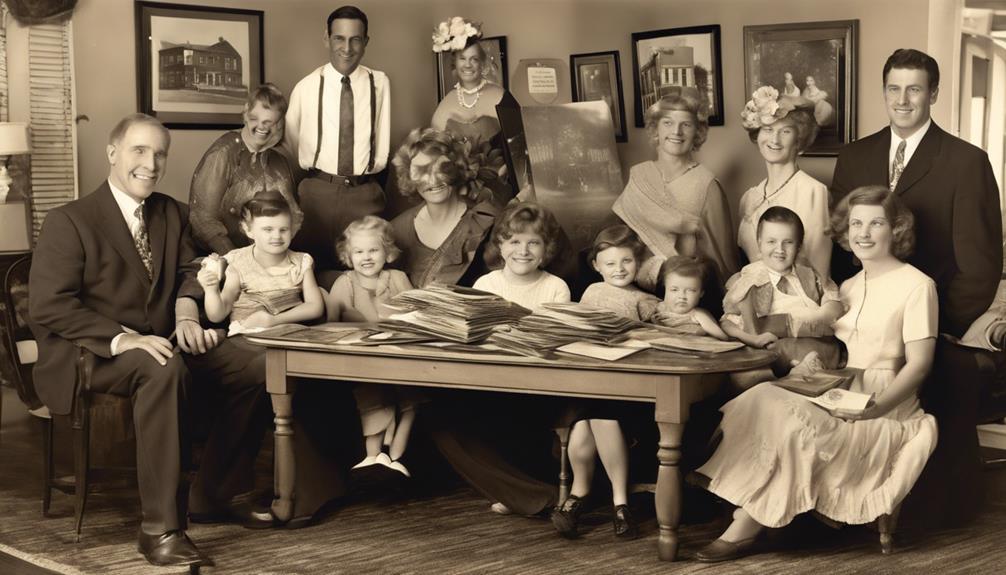
Sorting through family pictures provides a meaningful opportunity for dementia patients to reminisce about cherished moments and reconnect with familiar faces. Organizing these photos can stimulate cognitive functions, triggering memories of loved ones and past events.
As they sift through the pictures, emotions may surface, leading to conversations about shared experiences. This activity not only promotes memory recall but also encourages social interaction and storytelling.
Engaging in sorting family pictures can bring a sense of accomplishment and joy to dementia patients, fostering a positive atmosphere. The act of reminiscing through family photos allows individuals to feel connected to their history and loved ones, even if specific details may be challenging to recall.
Through this simple yet powerful activity, caregivers and family members can help create a warm and comforting environment that nurtures the patient's emotional well-being and sense of belonging.
Music Therapy Sessions
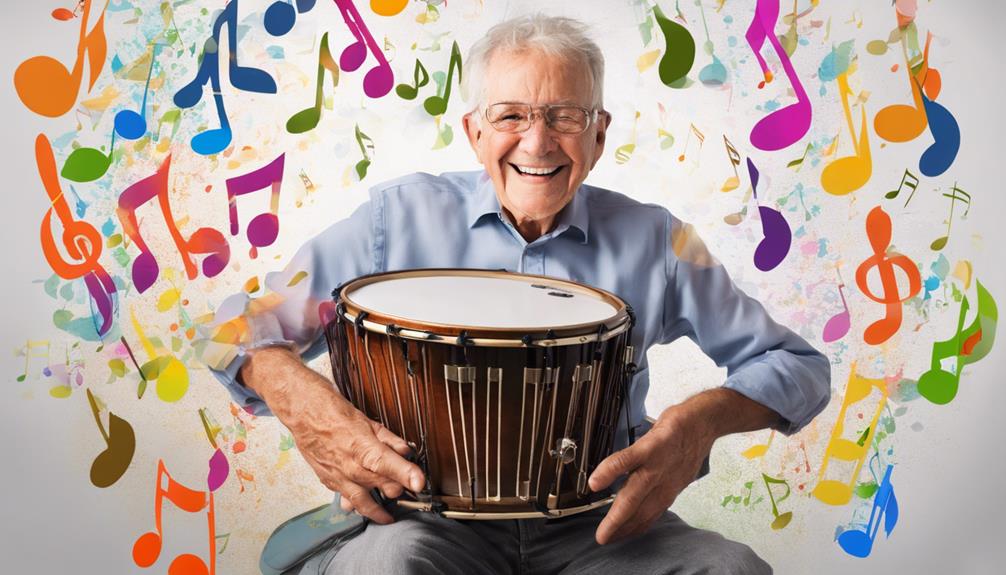
We understand the importance of music therapy sessions for dementia patients at home. These sessions can bring about a sense of calm, trigger positive memories, and create a space for emotional expression.
Choosing appropriate music tailored to the individual's preferences can enhance the effectiveness of the therapy.
Benefits of Music Therapy
Indisputably, music therapy offers significant benefits for dementia patients, enhancing mood, social interaction, and cognitive function. Engaging in music therapy sessions can have profound effects on individuals with dementia, improving various aspects of their well-being.
Here are four ways in which music therapy can positively impact the lives of dementia patients:
- Mood Enhancement: Music therapy has the power to uplift spirits, bringing joy and happiness to individuals with dementia.
- Memory Stimulation: Through music, memories can be triggered, aiding in memory recall and stimulating cognitive function.
- Stress Reduction: Music therapy promotes relaxation, reducing stress levels and creating a calming environment.
- Quality of Life Improvement: By reducing challenging behaviors, enhancing communication, and fostering meaningful experiences, music therapy contributes to an overall improvement in quality of life for dementia patients.
Choosing Appropriate Music
When selecting music for music therapy sessions with dementia patients, it's crucial to choose familiar songs that resonate with their personal history and preferences to maximize therapeutic benefits. Engaging in active listening and encouraging participation through singing, dancing, or playing simple instruments during these sessions can enhance the experience.
Music has the power to evoke memories, stimulate emotions, and promote social interaction, creating a holistic and enriching experience for individuals with dementia. By incorporating familiar music into daily routines, we can provide comfort, relaxation, and a sense of well-being for those living with dementia.
Gentle Yoga Exercises

Engaging in gentle yoga exercises at home can significantly enhance the well-being and cognitive function of dementia patients. Here are some key points to consider when incorporating gentle yoga into the routine of dementia patients:
- Improving Physical Well-being: Gentle yoga exercises can help improve flexibility, balance, and overall physical health in dementia patients, contributing to a better quality of life.
- Reducing Stress and Anxiety: Yoga activities promote relaxation, reduce stress, anxiety, and depression, fostering a sense of calm and tranquility.
- Enhancing Cognitive Function: Simple yoga poses tailored for seniors with dementia can enhance cognitive function and aid in memory recall, providing mental stimulation.
- Boosting Mood and Sleep Patterns: Regular engagement in gentle yoga can boost mood, increase circulation, and improve sleep patterns, contributing to a more positive outlook on life.
Incorporating gentle yoga into the daily routine of dementia patients can offer a holistic approach to their well-being, addressing both physical and mental health needs.
Painting and Coloring

Painting and coloring provide a therapeutic and creative outlet for dementia patients to express themselves artistically and engage their senses. These activities offer more than just a chance to create; they can also stimulate sensory experiences, promote relaxation, and enhance emotional well-being. For individuals with dementia, using simple painting techniques and larger brushes can make the process more manageable and enjoyable. Similarly, coloring activities, such as those found in adult coloring books, can help improve focus, concentration, and fine motor skills.
When engaging dementia patients in painting and coloring, consider incorporating a variety of colors and textures to enhance sensory stimulation. These elements can make the experience more immersive and enjoyable for the individual, fostering a sense of accomplishment and self-expression. By encouraging participation in these creative activities, caregivers can provide a meaningful and fulfilling outlet for dementia patients to connect with their emotions and memories through art.
Gardening Together
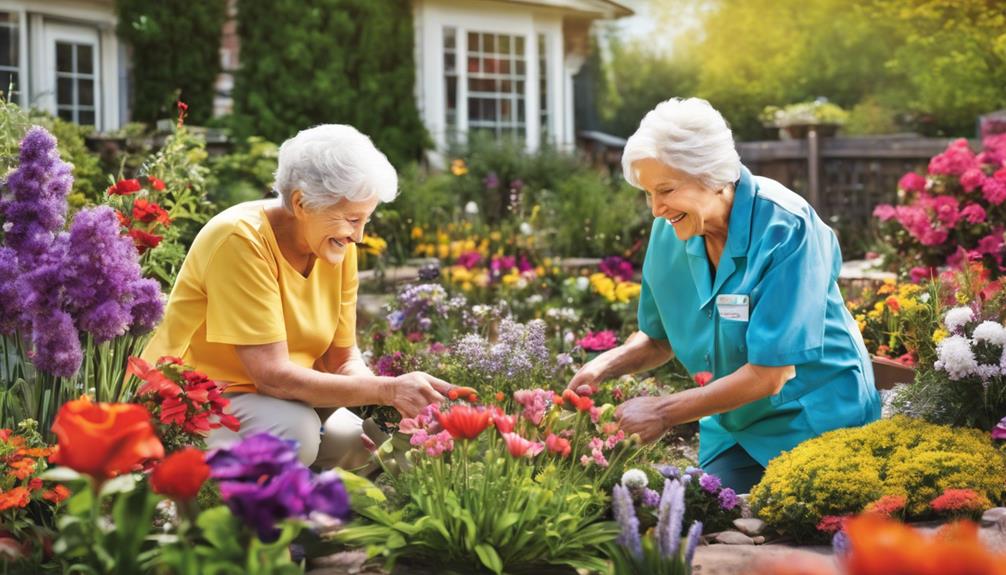
Gardening together can be a rewarding and therapeutic activity that fosters connection and joy for dementia patients and their caregivers. Engaging in gardening provides sensory experiences and offers numerous therapeutic benefits. Here are some ways to make the most out of gardening with dementia patients:
- Raised Mobile Gardens: Set up raised mobile gardens to make it easy for patients to access and maintain their garden beds, facilitating their active participation.
- Plant Edible Plants: Choose plants like strawberries and herbs for their sensory appeal. Encouraging patients to plant and care for edible plants can enhance their engagement and enjoyment.
- Individual Gardening Patches: If space allows, provide individual gardening patches. Personalized involvement can boost patients' sense of ownership and accomplishment.
- Therapeutic Benefits: The combination of fresh air, tactile experiences, and the nurturing of plants can have a calming effect on dementia patients, improving their mood and reducing stress levels.
Storytelling Sessions
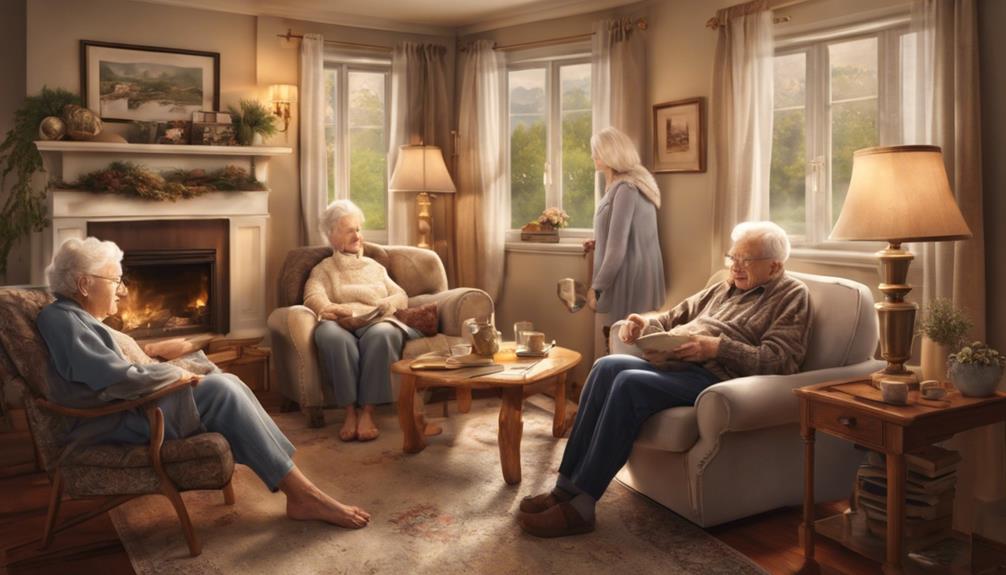
Incorporating storytelling into daily routines can enrich the lives of dementia patients by fostering connections and stimulating cognitive functions. Story sessions offer a wonderful opportunity for memory recall, allowing individuals to reminisce about past experiences and share personal stories. These sessions not only stimulate cognitive functions but also encourage social interaction, creating a supportive and engaging environment for individuals living with dementia.
Tailoring storytelling activities to individual interests is key to making the sessions more enjoyable and meaningful. By focusing on topics that resonate with each person, such as favorite hobbies or significant life events, we can enhance their engagement and emotional well-being. These personalized approaches help build connections and foster a sense of identity and belonging.
Furthermore, storytelling is a versatile activity that can be adapted to different cognitive levels and stages of dementia, ensuring that everyone can participate and benefit from this enriching experience. By embracing the power of storytelling, we can create moments of joy, connection, and cognitive stimulation for dementia patients in the comfort of their homes.
Puzzle Solving Time

Let's talk about the positive impact of puzzle solving on enhancing memory and cognitive skills for those dealing with dementia.
Engaging in puzzles not only stimulates the brain but also helps in developing problem-solving abilities.
It's truly remarkable how these activities can bring joy and a sense of accomplishment to individuals facing memory challenges.
Memory Boosting Puzzles
Engaging in memory-boosting puzzles is a valuable cognitive activity that can significantly enhance memory and problem-solving skills for individuals with dementia. Puzzle solving offers a stimulating and enjoyable way to exercise the brain, promoting cognitive function and memory care in those with Alzheimer's.
Here are some ways memory-boosting puzzles can benefit dementia patients:
- Improved Memory: Regularly engaging in puzzles can help slow down memory decline and enhance retention abilities.
- Enhanced Problem-Solving Skills: Solving puzzles challenges the brain, improving problem-solving skills and cognitive agility.
- Varied Challenge Levels: Different types of puzzles offer varying levels of difficulty, catering to individual cognitive abilities.
- Social Interaction: Puzzle solving can be a social activity, promoting engagement and connection between dementia patients and caregivers.
Cognitive Skills Development
As we move forward into exploring the cognitive skills development aspect of puzzle solving time, it's important to recognize the significant impact puzzles can have on memory and problem-solving abilities for dementia patients. Engaging in puzzle activities not only stimulates the brain but also promotes mental agility, which is especially beneficial for individuals with cognitive impairment.
Research indicates that puzzle solving can potentially delay cognitive decline and enhance overall brain function in people with dementia. Furthermore, completing puzzles can boost self-esteem and confidence in dementia patients by providing them with a sense of accomplishment.
Regular participation in puzzle solving sessions can play a crucial role in maintaining cognitive abilities and mental acuity in individuals facing the challenges of dementia.
Dance and Movement Classes

Dance and movement classes offer valuable benefits for dementia patients, including improved physical coordination, balance, and flexibility. Engaging in these activities at home can have a profound impact on the overall well-being of individuals with dementia. Here are four ways dance and movement classes can positively influence the lives of those with cognitive impairments:
- Enhanced Cognitive Function: Studies have demonstrated that participating in dance therapy can stimulate cognitive function and memory retention in individuals with dementia.
- Improved Social Interaction: Dance classes provide a platform for social engagement, fostering connections with others and reducing feelings of isolation.
- Boosted Emotional Well-being: Engaging in dance and movement activities can enhance mood, reduce stress, and promote self-expression, leading to an overall improvement in emotional well-being.
- Quality of Life: Dance therapy has been found to enhance the quality of life for dementia patients by offering a fun and engaging way to stay active and connected.
Aromatherapy Sessions

Utilizing essential oils to stimulate the sense of smell can offer calming and therapeutic benefits for dementia patients engaging in aromatherapy sessions at home. Aromatherapy, with scents like lavender or citrus, has been shown to promote relaxation and reduce anxiety in individuals with dementia. These sessions not only help improve mood and sleep quality but also enhance the overall well-being of dementia patients. It's crucial to ensure the proper dilution and safe use of essential oils during these sessions to prevent any adverse reactions.
Aromatherapy can be a soothing and therapeutic activity that enriches the sensory experience for dementia patients, creating a peaceful environment where they can relax and unwind. The power of scent is remarkable in evoking memories and emotions, making aromatherapy a valuable tool in caring for individuals with dementia. By incorporating aromatherapy into their routine, caregivers can provide a holistic approach to improving the quality of life for their loved ones.
Bird Watching Together

Engaging in bird watching together can foster a sense of connection with nature and provide a calming and engaging activity for dementia patients at home. Bird watching allows us to observe the beauty of different bird species, listen to their songs, and enjoy the peacefulness of the outdoors. Here are four ways bird watching can benefit dementia patients:
- Nature Connection: Watching birds in their natural habitat helps us feel more connected to the environment around us, promoting a sense of tranquility and harmony.
- Sensory Stimulation: The sights and sounds of birds provide sensory stimulation, engaging our senses and sparking moments of joy and curiosity.
- Mindfulness: Bird watching encourages us to be present in the moment, focusing on the beauty of the birds and their behaviors, which can help reduce stress and anxiety.
- Emotional Well-being: This activity can boost mood, evoke a sense of wonder, and create a peaceful and enjoyable experience for dementia patients, enhancing their overall emotional well-being.
Simple Card Games

When looking for engaging activities to provide cognitive stimulation for dementia patients at home, simple card games like Go Fish, Memory, and Uno offer a beneficial and enjoyable option. These card games aren't only fun but also help improve memory, focus, and social interaction skills in individuals with dementia. Playing card games can serve as a meaningful way to spend quality time with our loved ones who are dealing with dementia. The simplicity of these games makes them easy to learn and adaptable to different skill levels, allowing for modifications based on varying degrees of cognitive abilities.
Engaging in card games on a regular basis can assist in maintaining mental sharpness and provide a sense of accomplishment for dementia patients. The social interaction that comes with playing these games can also help in fostering connections and creating moments of joy and shared experiences. Therefore, incorporating simple card games into daily routines can be a valuable addition to the care and support we offer to our loved ones with dementia.
Frequently Asked Questions
How Do You Keep a Dementia Person Busy?
We keep a dementia person busy by engaging them in simple tasks, stimulating activities, and providing a structured routine.
Encouraging participation in sensory experiences, cognitive challenges, and physical activities can help keep them occupied and promote well-being.
What Are 3 Things Not to Say to Someone With Dementia?
We should avoid saying phrases like 'You should remember this,' 'You're wrong,' or 'I already told you that' to someone with dementia as it can be frustrating, confusing, or cause distress.
Using simple language, avoiding complex explanations, and not pressuring them with too many questions is essential.
It's important to communicate compassionately and respectfully to support individuals living with dementia.
What Are the Indoor Activities for Adults With Dementia?
When considering indoor activities for adults with dementia, it's important to focus on engaging and stimulating options.
Activities like listening to music, looking at family photos, or participating in simple craft projects can provide enjoyment and cognitive stimulation. Reading together, solving puzzles, or playing memory games are also beneficial.
Additionally, sensory stimulation activities, personal care tasks, and kitchen-related activities can enhance well-being and create meaningful experiences for adults with dementia.
What Is the Number One Trigger for Dementia Behavior?
Understanding the underlying triggers of dementia behavior is crucial for effective management. Often, unmet needs and communication difficulties serve as the number one trigger for challenging behaviors in dementia patients. Changes in routine, environment, or caregivers can also play a significant role.
Conclusion
In conclusion, engaging dementia patients in various activities at home is crucial for their well-being and cognitive stimulation. By incorporating outdoor walks, sensory activities, memory scrapbooking, and more, we can provide them with mental challenges and social interaction that enhance their quality of life.
Stay tuned for more tips and ideas on how to create meaningful experiences for your loved ones living with dementia. Together, we can make a difference in their lives.
Albert brings a wealth of knowledge and expertise to our writing team. With a background in caregiving and a deep understanding of the challenges faced by caregivers, Albert’s writing resonates with authenticity and empathy. He is committed to delivering high-quality content that empowers and supports caregivers on their journey.
-

 Dementia Care2 months ago
Dementia Care2 months agoUnderstanding the Stages of Vascular Dementia: A Visual Chart Guide
-

 Dementia Care3 months ago
Dementia Care3 months ago10 Engaging Dementia Games for Cognitive Stimulation
-

 Dementia Care3 months ago
Dementia Care3 months agoHow Gabapentin Affects Dementia: A Comprehensive Guide
-

 Dementia Care3 months ago
Dementia Care3 months ago5 Things You Need to Know About Jack Nicholson’s Dementia
-

 Dementia Care1 month ago
Dementia Care1 month agoUnderstanding Narcissism and Dementia: A How-To Guide
-
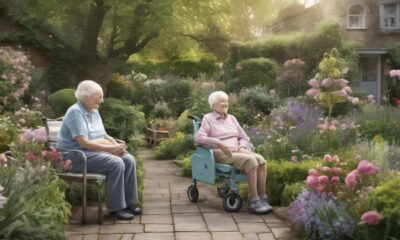
 Dementia Care1 month ago
Dementia Care1 month agoHow to Deal with a Parent’s Dementia: A Practical Guide
-

 Dementia Care1 month ago
Dementia Care1 month agoDavid Suchet’s Wife Opens Up About Living with Dementia
-

 Dementia Care1 month ago
Dementia Care1 month agoUnderstanding the Link Between Ambien and Dementia: A How-To Guide




















